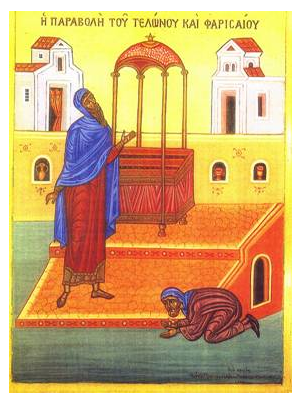On Being Good Pharisees:
Sunday of the Publican and the Pharisee
“I thank you God, that I am like the rest of men and women – imperfect but loved by You, sinful yet forgiven by You, unable to save myself spiritually, but so embraced by you and your saving Spirit.” The Prayer of the Good Pharisee
 Are you a Pharisee? Or to put it another way – are you like the Pharisee in this week’s gospel?
Are you a Pharisee? Or to put it another way – are you like the Pharisee in this week’s gospel?
The Parable of the Publican and the Pharisee confronts us with a stark contrast between religious pride and self-righteousness on the one hand, and heartfelt humility and repentance on the other hand. The Pharisee is the one who manifests pride, and it is the publican who manifests humility. The Lord closes this short parable by declaring the Pharisee “condemned” and the publican “justified.”
Christ is not condemning the actions of the Pharisee. The Lord is not telling us through this parable that the Pharisee – or anyone else, and that includes us – is wasting both time and energy by going up to the temple to pray, by fasting and by tithing. These are not being condemned as empty practices, consigning all such practitioners to the barren realm of hypocrisy and religious formalism. We, as contemporary Christians, are encouraged to enter the church with regularity and offer our prayer to God, to practice the self restraint and discipline of fasting, and to share our financial resources with the generosity implied by the biblical tithe. We could add other practices to that. In fact, we would do well to imitate the outward actions of the Pharisee in practicing our Faith!
Yet, on a deeper and far more significant level, the Pharisee got it all wrong. He was consumed by a self-satisfied and self-righteous interior attitude that left no room for God to transform him by divine grace. The Pharisee’s prayer was seemingly directed to God, but in reality it was an exercise in self-congratulations (for not being like other sinful men). Here was a man who did not suffer over low self-esteem! The Pharisee was self-centered, but not God-centered. Something went wrong, and the self replaced God as the center of his energy and passion. The exterior forms of piety that he practiced were disconnected from the interior realm of the heart, where God is meant to dwell and, again, transform the human person from within, so that each person becomes less self-centered and more God-centered with time and patience.
We all know the story of the Publican and the Pharisee, but don’t see that we are the Pharisee and maybe a little bit the Publican. And the more we become like the Publican, not in his deeds, but in his humility, then we will become justified. The fault of the Pharisee is that he has no desire to change his outlook; he is complacent, self-satisfied, and so he allows no place for God to act within him; he felt no need to repent. Anyone thinking this way could be labelled a modern Pharisee. However, anyone trying to live a Christian life, albeit imperfectly, could be labelled a good Pharisee.
So what makes a good Pharisee? A good Pharisee prays like this: “I thank you God, that I am like the rest of men and women – imperfect but loved by You, sinful yet forgiven by You, unable to save myself spiritually, but so embraced by you and your saving Spirit.” We are not thankful for our sins, but we are grateful for our awareness of them and for the humility, compassion and forgiveness that are available from the Lord because of that awareness.
Good Pharisees, like the Publican, know they are sinners. This keeps them from becoming phonies. Jesus loved sinners and distrusted phonies. The world often taunts us with our imperfections and sinfulness, as if our faults prove that our Faith and practices are nothing but empty show. When someone says, “You Catholics claim to be religious, but there are plenty of people who don’t go to church and they live better lives than you.” we must answer truthfully. “Yes, but how much worse would we be without faith! You are right about us’ we need to reform. We must try to do better. Please pray for us.” That’s the response of the sinner, the good Pharisee. That’s the humble answer that leads to repentance, forgiveness and renewal.
 And the Publican? Based on our knowledge of the role of the publican in first century Israel, we can be assured that Christ was not “justifying” the particular “lifestyle” that made the publicans such notorious and despised figures of that world. Rather, the publican was declared “justified” for the very fact that he recognized and was profoundly struck by just how sinful he had become in cheating and defrauding his neighbor as a hated tax-collector working for the occupying Roman authority.
And the Publican? Based on our knowledge of the role of the publican in first century Israel, we can be assured that Christ was not “justifying” the particular “lifestyle” that made the publicans such notorious and despised figures of that world. Rather, the publican was declared “justified” for the very fact that he recognized and was profoundly struck by just how sinful he had become in cheating and defrauding his neighbor as a hated tax-collector working for the occupying Roman authority.
This publican understood God. He also knew himself. He was guilty of many things, but he wanted to change. He went to the temple knowing he was not worthy, but trusting that God could change him. And he was justified, because he had faith in God. Was he failing? Did he still have greed in his heart? Of course! It takes a long time to divest yourself of your passions. It is a hard lesson to learn.
Thus, our preparation for Lent begins with a prayer for humility, the beginning of true repentance. Through repentance, we restore our spiritual vision. By entering Great Lent in humility and repentance, we can attain deeper communion with God as we receive His forgiveness. If we carry our pride on this journey of Lent, we will not be aware of our failings and our need for God’s grace. Without this awareness, we cannot experience that great conversion of the heart (metanoia) that will lead us into a deeper relationship with God.
The week following this Sunday is a privileged week: we are allowed to eat meat on Friday. This reinforces the lesson of the Publican and the Pharisee that inner humility shows God a truer heart than outward signs that are empty and lead to pride.
In order to complete the Great Fast journey, we need to recognize that we are creatures, not Creator. God alone holds that title and we must bow before God in humility. Humility means to recognize that without God we really can do nothing. Without God’s love for us, our next breath would be impossible. It does not mean to put ourselves down excessively but to be honest about our shortcomings as well as our gifts. 
We live in a culture obsessed with the self openly promoting, both pride and vainglory. “In your face” is widely seen as a “heroic” gesture of self-defiance and legitimate self-promotion. Humility is treated as weakness and ineffectual for “getting ahead” or for fulfilling one’s desires. We hear the voice of the Lord and we hear the voice of the world. It is our choice as to which voice we will listen to. And that choice will be determined to a great extent by just what the desires that move us to action are actually for. “For where your treasure is there will your heart be also”.
Adapted with appreciation from:
Orthodox Church in America at the-publican-the-pharisee-and-the-struggle-for-humility
Passages in blue are excerpted from Precious as Silver by George H. Niederauer. Copyright 2003 by Ave Maria Press, P.O. Box 428, Notre Dame, IN 46556. Used with permission of the publisher.
